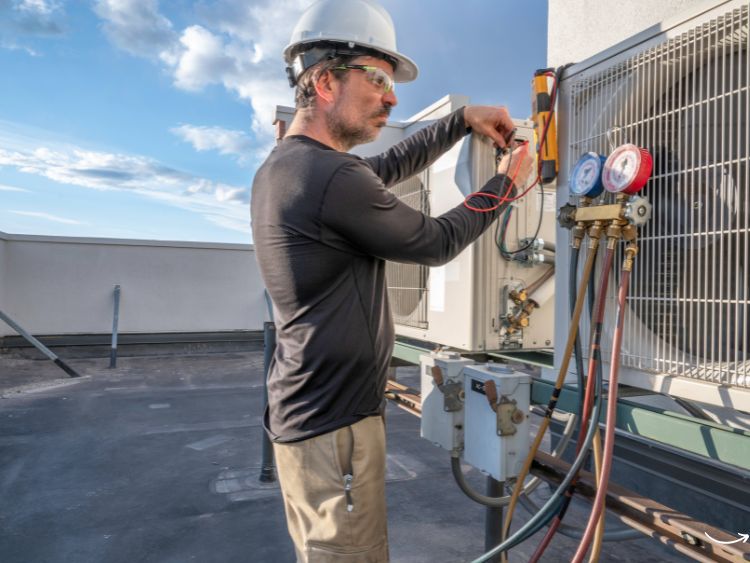When thinking about a career that offers stability, growth opportunities, and a chance to work with your hands, an HVAC job might just be the perfect fit. The HVAC industry—short for Heating, Ventilation, and Air Conditioning—plays a crucial role in ensuring comfort and safety in residential, commercial, and industrial settings. If you’re curious about what an HVAC job entails and how you can start a career in this field, you’re in the right place.
Understanding the HVAC Industry
The HVAC industry is a dynamic field that encompasses various aspects of climate control. From installing air conditioning units in homes to maintaining complex heating systems in large buildings, HVAC technicians are essential for keeping our environments comfortable and safe. But what does an HVAC job really involve?
What Does an HVAC Technician Do?
An HVAC technician’s responsibilities are diverse and can vary depending on the specific job or project. Here are some of the typical tasks you might encounter:
- Installation: Setting up new HVAC systems in residential or commercial properties.
- Maintenance: Performing regular checks and upkeep to ensure systems are running efficiently.
- Repairs: Troubleshooting and fixing issues that arise in heating, cooling, and ventilation systems.
- Customer Service: Interacting with clients to explain issues, suggest solutions, and provide cost estimates.
Essential Skills for HVAC Jobs
To thrive in an HVAC job, certain skills are crucial. These include:
- Technical Proficiency: Understanding the mechanics of HVAC systems and how to repair them.
- Problem-Solving: The ability to diagnose issues quickly and effectively.
- Customer Relations: Good communication skills to explain complex issues in simple terms.
- Physical Stamina: The job often requires lifting heavy equipment and working in various environments, sometimes in tight or awkward spaces.
Why Choose a Career in HVAC?
There are numerous reasons why pursuing an HVAC job can be a rewarding career choice. Here are some compelling benefits:
Job Stability
The HVAC industry is growing. With the increasing need for energy-efficient systems and the ongoing maintenance of existing units, HVAC technicians are in high demand. This means job security for those entering the field.
Competitive Salaries
HVAC technicians earn a competitive wage, with the potential for higher earnings as you gain experience and certifications. According to the Bureau of Labor Statistics, the median annual wage for HVAC technicians was $50,590 in 2020, with the top 10% earning more than $80,000.
Career Advancement
Starting as an entry-level technician, you have the opportunity to advance your career by gaining experience, obtaining additional certifications, or even starting your own HVAC business. Specializing in areas such as commercial systems, refrigeration, or green energy solutions can also open doors to higher-paying positions.
Hands-On Work
If you enjoy working with your hands and solving problems, an HVAC job provides plenty of opportunities to do just that. Every day brings different challenges, keeping the work interesting and engaging.
How to Get Started in HVAC
Education and Training
Most HVAC technicians start with a high school diploma or GED. From there, they typically complete a technical training program at a community college or trade school. These programs usually last between six months and two years and cover the basics of HVAC systems, including:
- Thermodynamics
- Refrigeration
- Electrical systems
- Safety protocols
Apprenticeships
After completing formal education, aspiring HVAC technicians often enter an apprenticeship. These programs provide hands-on experience under the guidance of experienced professionals and can last from three to five years. Apprenticeships are invaluable for gaining practical skills and building a strong foundation in the field.
Certification and Licensing
Certifications are crucial for demonstrating your expertise and enhancing your job prospects. The most recognized certifications include:
- EPA Section 608 Certification: Required for handling refrigerants.
- North American Technician Excellence (NATE) Certification: A highly regarded credential in the HVAC industry.
- HVAC Excellence Certification: Offers specialized certifications in various areas of HVAC.
Licensing requirements vary by state, so it’s important to check the specific regulations in your area.
Continuous Learning
The HVAC industry is constantly evolving, with new technologies and regulations emerging regularly. Continuing education is essential to stay current with industry standards and advancements. Many organizations and manufacturers offer ongoing training programs and workshops.
FAQs About HVAC Jobs
What is the average salary for an HVAC technician?
The average salary for an HVAC technician varies based on experience, location, and specialization. As mentioned earlier, the median annual wage is around $50,590, but experienced technicians and those with specialized skills can earn significantly more.
Is the HVAC industry growing?
Yes, the HVAC industry is experiencing steady growth. Factors such as increasing construction activities, a focus on energy efficiency, and the need for maintenance of existing systems contribute to the rising demand for HVAC professionals.
What are the working conditions like for HVAC technicians?
HVAC technicians often work in diverse environments, from residential homes to large commercial buildings. The job can involve working in confined spaces, at heights, and in varying weather conditions. Physical stamina is important, as the role can be physically demanding.
How long does it take to become an HVAC technician?
The time it takes to become an HVAC technician can vary. Completing a technical training program can take six months to two years. An apprenticeship can add another three to five years. Therefore, it can take between three and seven years to become fully qualified, depending on your chosen path.



